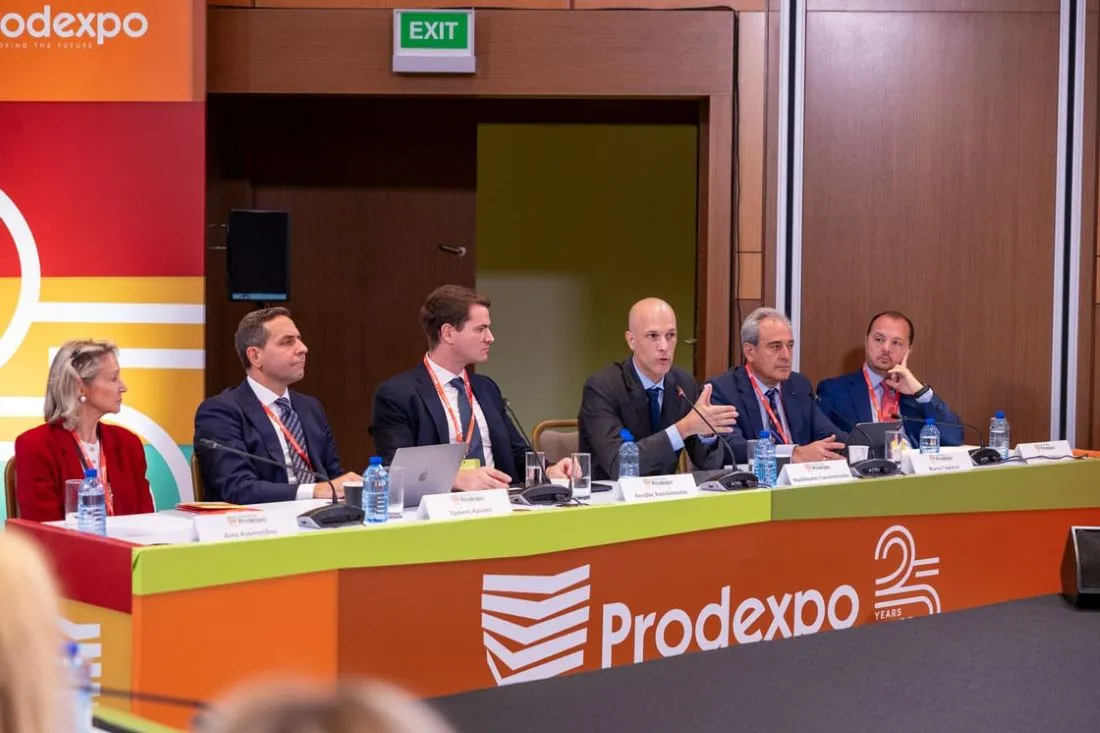
Senior market participants examined the real estate market trends at the Executive Leaders' Breakfast, which came before the start of the 25th Prodexpo conference, highlighting both opportunities and risks.
They referred, among other things, to the challenges facing the sector, the categories of property that attract investors, the importance of sustainable buildings, and the problems created by the lack of infrastructure and the uncertainty of planning legislation.
UNCERTAINTY
Special reference was made to the issue of the New Building Regulation, with Dika Agapitidou, General Manager of Athenian Finance/JLL, describing uncertainty as the worst advisor. "There has been a lot of turmoil over a law that was passed in 2012. It took us 12 years to realize that there is an issue," Agapitidou said, explaining that the Plenary of the Council of State will decide whether the provisions on the bonuses of the NOC are constitutional. She noted that there should be proper consultation before any legislation in order to avoid all this uncertainty. The Ministry of Environment has taken a step back and is asking the CoE not to abolish them but to ask for strict adherence to them; the municipalities are talking about the destruction of the environment because this has not been done before because there was no consultation, too much turmoil from uncertainty, proper consultation, and planning.
THE PROBLEMS
Panagiotis Bernitsas, Managing Partner of Bernitsas Law, mentioned the issues that have arisen as a result of the NOC's implementation as well as from the lack of integrated spatial and urban planning. "The NOC was passed in 2012 and we are still discussing the basics," he said, noting that if a deed gave someone the right to build and was then cancelled, it opens up the issue of compensation from the state, but this will take many years. According to Bernitsa, there have been improvements in legislation recently, but more is needed, citing the problem with the transition from mortgage offices to land registry offices, as well as the 500,000 objections to forest maps, with most committees not set up.
IN A DIFFICULT POSITION
Fotis Gioftsios, CEO of Ten Brinke Hellas, emphasized the precarious situation in which many investors have found themselves as a result of the NOC and emphasized the urgency of finding a quick solution to prevent a recurrence. "The image of our country is being damaged from the front to the back with building permits. He emphasized that "there is a great deal of uncertainty, and this situation has hurt many people." He spoke of a major problem that needs to be addressed immediately, explaining that investors need reliable legislation.
SOCIAL RESIDENTIALITY
Nikos Dimtsas, Deputy CEO of Dimand, emphasized the need for the state to directly or indirectly subsidize social housing. "Greece is the country with the highest burden on households in terms of housing costs. We need the assistance of the state," Dimantas noted. He said that the law on social rent was passed two years ago but has not yet been implemented, suggesting that the issue should be addressed by utilizing properties from the large stock of properties held by the organizations and the state.
UPGRADING
Panagiotis Kapetanakos, CEO of Noval Property, stressed that there is a need for upgrading in the infrastructure and services of the state, also raising the issue of the lack of capacity in construction. He noted that investing in sustainability is the trend for the future and creates added value, as well as the use of modern technologies. "We need to look carefully at supply and demand, location, and new trends," he added.
REAL ESTATE EXCHANGE
Athanasios Karagiannis, Chief Investment Officer of Prodea Investments, argued that the market is not very deep and its future depends a lot on the users. "We need to fix the infrastructure part first and we need support at the government level to improve it so that the infrastructure can be tied to private investment," he said. He added that if we do not increase the depth of users, companies will swap properties with each other.
THE BIGGEST CHALLENGES
Henry Arones, CEO of Hellenic Properties, concurred with the notion that businesses would eventually engage in trade. "We have to ask ourselves where we are going. I don't see it as a challenge, but as a great opportunity. To look at the market in a European context and not a local one," said Arones. He stressed that foreign investors have included Greece for investment, prices have risen enough to attract more and more sellers to the market, and banks are keen to lend. As for the biggest challenges, he mentioned the stability of the institutional framework, construction costs and investment in infrastructure.
IN A STATUS OF EUPHORIA
For her part, Natalia Straftis, Deputy CEO of Grivalia Hospitality, stressed that tourism is in a state of euphoria, having outperformed in 2019, but at the same time it is in a phase of trying to find its stride. "Maintaining and strengthening tourism is a one-way street. But we seem confused about which direction to take," she said. She stressed that we need better management to achieve better dispersion of tourism in the country, but also a temporal dispersion of tourism over time. She also pointed to the problem of infrastructure, saying that they are suffering and cannot withstand the flows, hence the need for decisions and directions from the State. He added that 10 tourism investments have been frozen for 18 months at Enterprise Greece, awaiting the approval of the inter-ministerial committee.






